





Conversation Cards - Simple Choices: Easy and Fun Decisions for Kids Encourage Thoughtful Choices with Fun and Relatable Scenarios
₹80
₹160
50% off
0 (0 ratings)
Grade Levels
Pre-K - Grade 2 (Ages 3-7)
Content Overview
Format: Printable PDF Total Pages: 3 Features: 22 Questions/Statements, High-Quality Illustrations, Easy-to-Use, Thought-Provoking Choices
Pages from the Resource
These Conversation Cards - Simple Choices help children practice decision-making with fun, everyday scenarios. Each card presents a simple choice, encouraging critical thinking, language skills, and social interaction. Ideal for parents, educators, and therapists working with young learners.

Page 1

Page 2
What Users Say
0
0 ratings
5
0+
4
0+
3
0+
2
0+
1
0+
5 Stars
Product is Good to use.
10 months ago
Varsha Parent
Similar Products
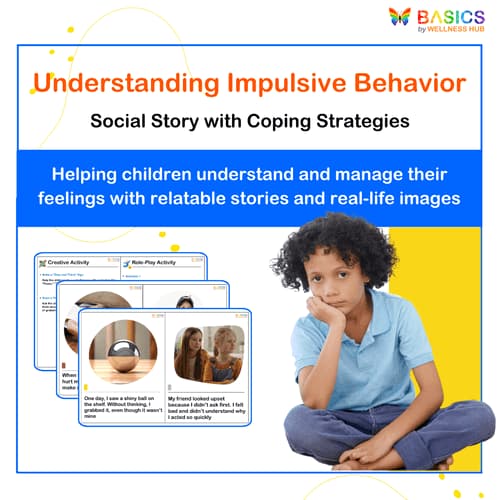
Understanding Impulsive Behavior: Social Story with Coping Strategies
₹ 80.00
₹ 160.00
50% off
4.9 (42 ratings)
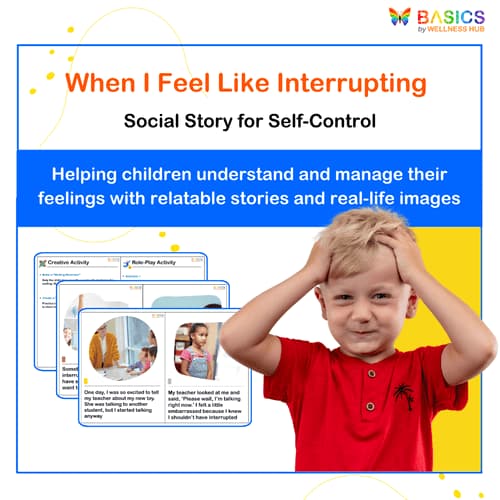
When I Feel Like Interrupting – Social Story for Self-Control
₹ 80.00
₹ 160.00
50% off
4.8 (60 ratings)
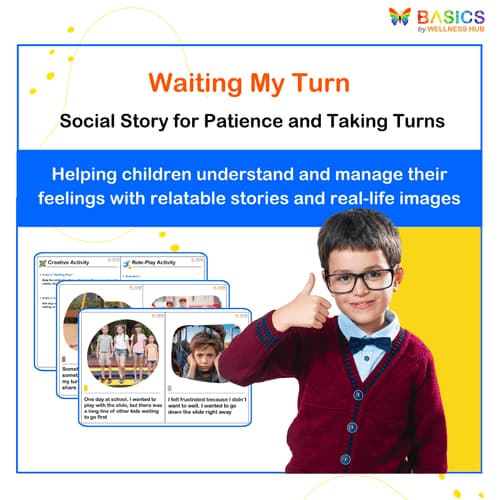
Waiting My Turn – Social Story for Patience and Taking Turns
₹ 80.00
₹ 160.00
50% off
4.7 (56 ratings)
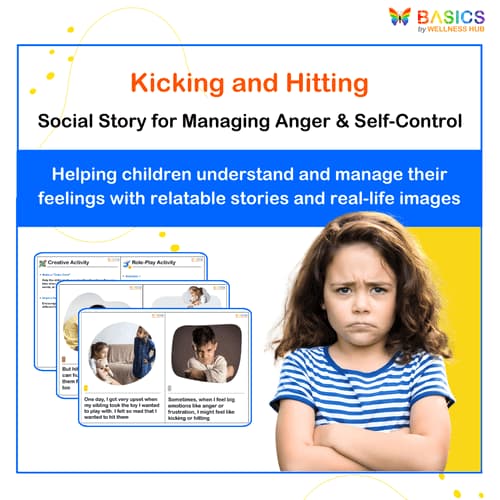
Kicking and Hitting – Social Story for Managing Anger & Self-Control
₹ 80.00
₹ 160.00
50% off
4.6 (52 ratings)
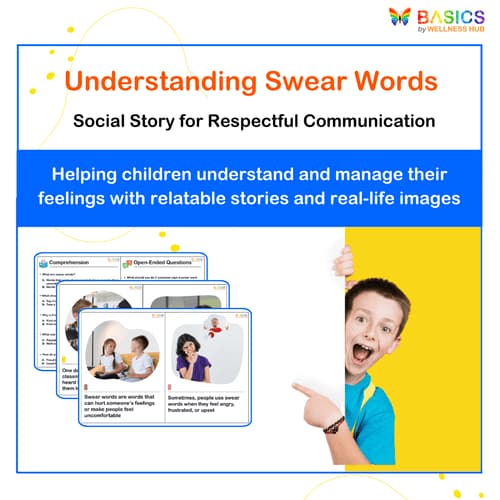
Understanding Swear Words – Social Story for Respectful Communication
₹ 80.00
₹ 160.00
50% off
4.9 (48 ratings)
About the Product
Purpose of Flashcards: The "Conversation Cards - Simple Choices" resource is designed to engage young children in making everyday decisions and expressing preferences. These cards present simple, relatable scenarios that encourage kids to think critically, communicate their thoughts, and articulate their preferences. Perfect for parents, educators, and therapists, these cards offer a playful and interactive way to build early decision-making skills, while also enhancing language and social skills. Whether used at home, in therapy, or in a classroom setting, these conversation starters are an ideal tool for helping children express themselves confidently and clearly.
Product Details
Format: Digital PDF
Total Pages: 3 pages
Total Cards: 22 cards with high-quality illustrations and easy-to-read prompts
Card Layout: Each page contains 8 cards, featuring a choice question or statement alongside vibrant images to engage children visually.
Design and Quality: The cards are designed with colorful, child-friendly illustrations and clear text. They are optimized for both printing and digital use, making them versatile for different learning environments.
Educational Benefits
Decision-Making Skills: These cards introduce children to everyday decision-making scenarios, helping them practice making choices and considering different options.
Language Development: Each card prompts children to express their preferences, building vocabulary and enhancing their ability to communicate thoughts clearly.
Social Skills: By discussing their choices, children learn to listen, take turns, and respect different opinions, fostering important social interaction skills.
Critical Thinking: The variety of scenarios helps children practice critical thinking by considering different outcomes and reasoning through their decisions.
Confidence Building: Encouraging kids to voice their preferences and explain their reasons helps build confidence in their communication abilities.
Instructions for Use
Printing Recommendations: For best results, print the cards on high-quality, thick paper or cardstock. Use a color printer for vibrant visuals that capture children’s attention. You can also laminate the cards for durability and repeated use.
Cutting and Preparation: Once printed, carefully cut out each card along the designated borders. Laminating the cards is highly recommended, especially if they will be handled frequently in classroom or therapy settings.
Getting Started: Begin by introducing a few cards at a time to help the child become comfortable with the activity. Present a card, read the question or statement aloud, and encourage the child to think about their response and explain their choice. Use positive reinforcement to encourage more detailed answers by asking follow-up questions, such as “Why do you like that food?” or “When do you usually eat it?” to deepen the conversation.
Use in Different Settings: At home, these cards can serve as conversation starters during meals, playtime, or before bedtime, providing a perfect opportunity for bonding while teaching important life skills. In therapy, the cards are excellent tools for speech and language therapy, helping children practice articulation, sentence formation, and decision-making in a fun and engaging way. In the classroom, teachers can use the cards during group discussions, circle time, or small group work to encourage communication and collaborative decision-making among students.
Expanding the Activity: Encourage children to create their own choice questions, fostering creativity and further developing their ability to make decisions.
Activities Using the Resource
Choice of the Day: Each day, select a "choice of the day" card to discuss with the child, such as "Would you rather have an apple or a banana?" Encourage the child to think about their answer and explain why they made that choice. This activity can become part of a morning routine, helping to set the tone for daily communication and decision-making practice.
Role-Playing Games: Use the cards as prompts for role-playing scenarios. For example, if the card asks, "Would you rather play inside or go outside?" follow up by engaging in a related role-play activity, such as pretending to play in the park or having an indoor picnic. This approach helps children connect their choices to real-life activities while enhancing their imaginative play.
Group Discussion and Debates: In classroom or group settings, use the cards to spark discussions by splitting children into groups and asking them to choose between two options, such as "Would you rather swim in a pool or play in the sand at the beach?" Encourage the children to explain their preferences and engage in friendly debates. This activity promotes teamwork, listening skills, and respectful communication.
Interactive Storytelling: Incorporate the choice prompts into storytelling sessions. For instance, a question like "Do you like chocolate ice cream or vanilla ice cream better?" can inspire a story about an ice cream party. Encourage the child to expand on the story based on their choices, helping them develop narrative skills and creativity.
Personalized Question Crafting: Once the child becomes familiar with the cards, encourage them to create their own choice questions. This deepens their understanding of the activity while boosting creativity and ownership of the learning process. They can draw pictures or choose items around the house to represent their questions, making the activity even more engaging and personalized.
FAQs
Q1: Can these cards be used with children who have special needs?
A1: Absolutely! These cards are designed to be versatile and accessible for all children, including those with special needs. The clear visuals and straightforward questions make them suitable for speech therapy, occupational therapy, and special education.
Q2: How do I encourage my child to give more detailed answers instead of just choosing between the options?
A2: After the child makes a choice, ask follow-up questions like "Why did you choose that?" or "Can you tell me more about why you prefer that option?" This approach encourages deeper thinking and more elaborate responses.
Q3: Can I use these cards with non-verbal children?
A3: Yes, non-verbal children can still participate by pointing to their choices or using assistive communication devices. The images and questions are designed to be engaging for all types of learners.
Q4: How often should I introduce new cards to keep the activity engaging?
A4: Start with a small set of cards and gradually add more over time, depending on the child’s engagement level. Rotating the cards regularly or introducing new themes can maintain interest and excitement.
Q5: Can these cards be used in group settings?
A5: Yes! These cards work well for group discussions, class activities, or therapy sessions. They encourage interaction, peer learning, and cooperative play, making them perfect for small groups or classrooms.
Usage Rights and Restrictions
Personal Use Only: The "Conversation Cards - Simple Choices" resource is intended for personal use by the purchaser. It can be used at home, in classrooms, or in therapeutic settings, but it cannot be shared, resold, or distributed without permission.
No Commercial Use: Reproduction or distribution for commercial purposes is strictly prohibited.
Printing and Sharing: You may print as many copies as needed for personal use, but digital files must not be shared or uploaded to other websites or platforms.
Modification Restrictions: Modifying the content or using the images and text separately from the original format is not permitted.
Conclusion
Thank you for choosing our "Conversation Cards - Simple Choices" resource. We hope that these cards provide enjoyable, engaging, and valuable learning experiences for you and your child. By incorporating these simple choice scenarios into daily routines and play, you’ll be fostering critical thinking, communication, and decision-making skills in a fun and meaningful way. Happy learning and exploring!



